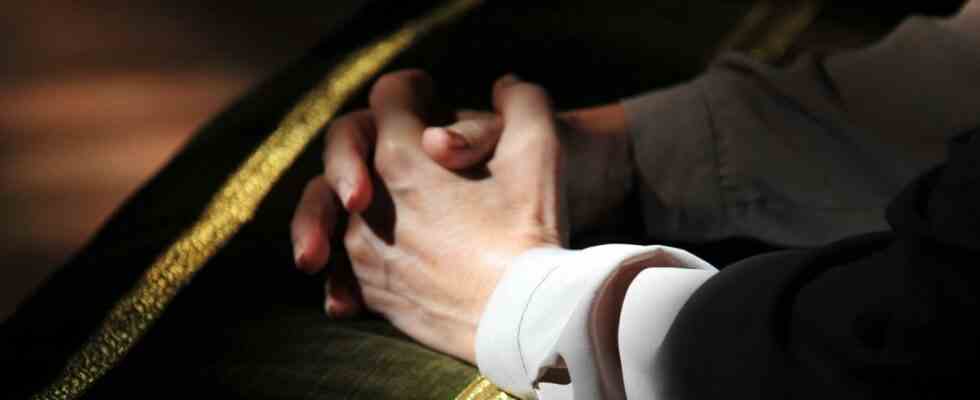In the ranking of problematic protagonists, a pedophile priest is probably very high on the list. No one wants to identify with him as a reader or viewer, and he doesn’t have the fascinating whiff of evil around him like so many criminals who attract and disgust in equal measure. One’s thoughts are immediately drawn to the Catholic Church’s most shameful cases of abuse, to the disastrous cover-up, to the immense pain that an institution has inflicted on its most vulnerable. Nothing about the character is fascinating, but much is repulsive.
Steven Uhly ventures into the heart of such a pedophile priest in his novel “The Sum of the Whole”, which is published by the Secession publishing house. He sets himself the almost impossible task of tracing the thoughts and feelings of his protagonist in such a way that we can understand them and still not get out, disgusted with him or with ourselves that we experience a moment of approval with him.
Of course, the more comfortable way would be to tell such a story from the victim’s side, it’s easy to sympathize with victims, but Uhly clearly has no desire to make himself comfortable. Not because he wants to use the novel to promote the differentiating view that “pedophile offenders also have feelings” (although that’s true, of course), but possibly because he enjoys the challenge.
Author Steven Uhly, born in Munich in 1964.
(Photo: Catherine Hess/SZ)
And to make it short: he masters it. On 156 pages, Uhly stages a chamber play from the confessional and the darkest corners of the human psyche that unfolds into a thriller. In the center stands Padre Roque de Guzmán, 50 years old. He follows what appears to be a comfortable priestly life on the outskirts of Madrid, directs a boys’ choir and looks after his flock in the confessional every day, appealing to their consciences and mumbling phrases about forgiveness. They are simple sinners: one hits his wife, the other goes to prostitutes. Guzmán sympathizes with her, encourages her to repent, until, and this is how the story begins, this angry man shows up in the confessional. “I have a tutor who…” he stammers and falters, but you can guess how the sentence should go on.
Isn’t this about love? And isn’t it God made?
A two-way conversation unfolds in the intimate anonymity of the confessional between Padre Guzmán and “the sinner”, Lucas Hernández, who from then on comes almost every day. He still hasn’t done anything that would be justiciable, but even his thoughts about the tutor are a sin, he knows that. He becomes more desperate every day, for the boy he feels “pity as for someone who has been caught in a natural disaster”. And “the padre listens with concern. He doesn’t want to see the images that the sinner conjures up with his words, but rather listen with a pure heart”.
In these dark conversations, Uhly keeps asking about sin, its beginning and the possibility of forgiveness. It quickly becomes clear that the Padre and Hernández are wrestling with the same demons. The padre has taken refuge behind church doctrine for his own protection, Hernández is looking for loopholes: Isn’t this about love? And isn’t it God made? “And lead us in temptation,” says a new translation of the Lord’s Prayer that has been under discussion for several years. So temptation is real and acceptable as long as you don’t blindly rush into it and let God guide you.
Steven Uhly: The sum of it all. Secession, Berlin 2022. 156 pages, 22 euros.
(Photo: Secession)
The fact that sin as a religiously threatening principle is one that a secular society can do less and less with does not make the story any less exciting, and “The Sum of the Whole” reads excellently as a mind game about guilt, responsibility and human freedom. Especially against the background of a very real crisis in the church, in which every confrontation with theological sin and also with very real legal guilt was avoided for an infinitely long time. “Sometimes he has the feeling that the sin itself is not the decisive factor, but this inner struggle that it causes,” Uhly writes about Padre Guzmán, one could also replace “sin” with “guilt” here.
But even the bold Steven Uhly doesn’t quite dare to stay completely with the sinners and their darkest desires, which is almost a shame, one would have liked to know how he pulls it off, two pedophiles in the confessional. A twist in the story, almost Hollywood, suddenly opens up a new narrative level. It relieves the reader of the displeasure of having spent a lot of time with problematic personalities, but is also a trick by Uhly to get rid of the problem of the pedophile protagonist in an uncomplicated way. Suffice it to say: Justice will be established. And also this: A Lord’s Prayer will not be enough here.

